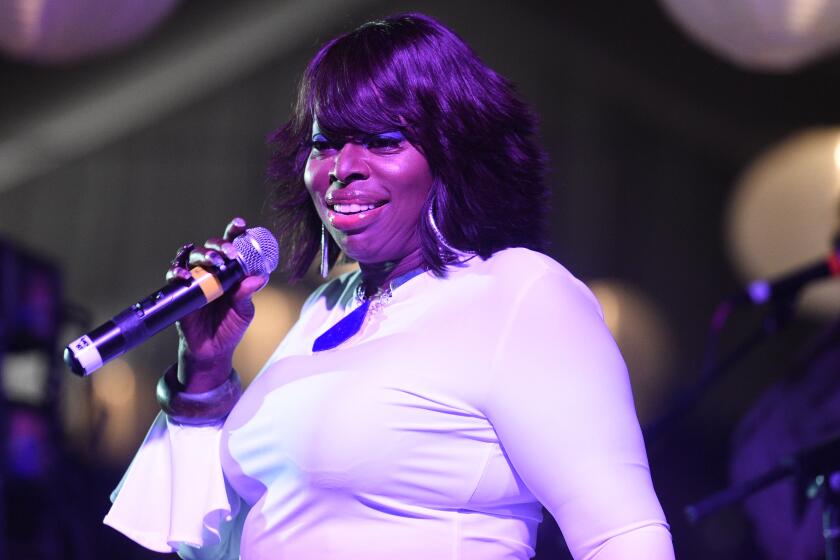Makeba Is Touring With a New Album and a Very Old Song
- Share via
She has been called “Mama Africa.” She has been a pop music star as well as a symbol of resistance. And, before the labels “world music” and “diva” were in common usage, she was a world music diva.
Her name, of course, is Miriam Makeba, and she makes a rare Los Angeles appearance on July 16 at the Hollywood Bowl on a World Festival 2000 bill that also features Cuban singer Albita with supporting act, singer Toshi Reagon and her group, Big Lovely.
Makeba arrives on the crest of her first new album in six years. Her program will feature songs from the CD, titled “Homeland” and released by Putumayo. Like much of her earlier work, the material is a mixture of songs in her native language, Xhosa, and a few pop-oriented numbers in English. But for Makeba fans, the most visible inclusion is “Pata Pata,” her Top 20 pop hit from 1967--the first U.S. Top 20 single by an African artist. (She was also the first African performer to win a Grammy, for the 1957 recording “An Evening With Harry Belafonte.”)
Despite the contemporary slant of the song’s rhythms and the presence on the track of her granddaughter, Zenzi Lee, Makeba was not initially enthusiastic about rerecording the brightly spirited song.
“When my producer asked me to do it,” says Makeba, “I thought, ‘Oh, my God, there it goes again. I’m never going to get away from that song.’ I’ve been singing it, you know, since 1956, years before the record became a hit in the U.S.”
But she is quick to acknowledge that she may be protesting too much, that she is fond of the new version and pleased that Putumayo chose it for inclusion in “The Best of World Music: World Vocal,” a 1995 compilation that also included works by such artists as Brazil’s Jorge Ben and Gilberto Gil, and Madagascar’s Rossy.
Makeba has lived in South Africa since she resettled there in 1992, 32 years after the then-apartheid government refused to grant her a return visa. By doing so, the white South African government, in effect, made Makeba a rallying point for anti-apartheid forces around the world. Already an emerging star, she became a political icon, even though she has always resisted the identification.
“I don’t see myself as a politician or politically involved as such,” says Makeba, “but I care about the politics that affect my life and those around me. Because all of us are human beings first and artists second. And I feel we have a responsibility to understand what is happening around us and to care about how it affects the world.”
Makeba’s iconic status shifted dramatically in 1968 when (after two previous marriages, including one to South African jazz trumpeter Hugh Masekela) she married black activist Stokely Carmichael. Although the marriage did not last, the political repercussions, she feels, have followed her career.
Nonetheless, her return to South Africa, the remarkable social and political changes that have taken place in her country, and the still potent qualities of her music have left Makeba, at 67, in a somewhat optimistic frame of mind. Some of that optimism drifts through “Homeland,” which, like so much of her other work, is referenced around the many manifestations of home and hearth, from both individual and collective points of view.
“There is a real strain of love in the album,” Makeba says. “Love for one continent, Africa, for one country, for one people. Which means we must get together, you help me and I’ll help you, all together, because this homeland belongs to us all.”
Miriam Makeba plays at 7 p.m. July 16 at the Hollywood Bowl, 2301 N. Highland Ave. Tickets: $5 to $85. (323) 850-2000.
Sounds on Record: Add French singer Clementine to the growing list of vocalists--mostly female--from other countries making impressive crossover forays into a variety of jazz-tinged blendings. Her “Couleur Cafe” (Go Jazz) roves from the title track, written by French pop culture enfant terrible Serge Gainsbourg, to three Jobim numbers and a piece by Djavan. Rhythms extend from bossa nova and straight-ahead jazz to the current Parisian salsa styles. Like Brazil’s Bebel Gilberto, Argentina’s Claudia Acuna and England’s Claire Martin (among numerous others), Clementine is making an impressive case for the productive interfacing between American jazz and vocalizing from virtually every part of the world.
Toure-Toure, the latest, and youngest, musical group to emerge from the Senegalese clan of Toure Kunda (one of the earliest high-visibility world music groups), has released its first album, “Ladde” (Tinder Records). Led by cousins Omar and Daby Toure, the band offers a smoothly accessible blending of acoustic harmonies with the infectious rhythms of Parisian Afro Pop. Toure-Toure performs at the Skirball Cultural Center on July 27.
*
Don Heckman can be reached at [email protected].
More to Read
The biggest entertainment stories
Get our big stories about Hollywood, film, television, music, arts, culture and more right in your inbox as soon as they publish.
You may occasionally receive promotional content from the Los Angeles Times.










